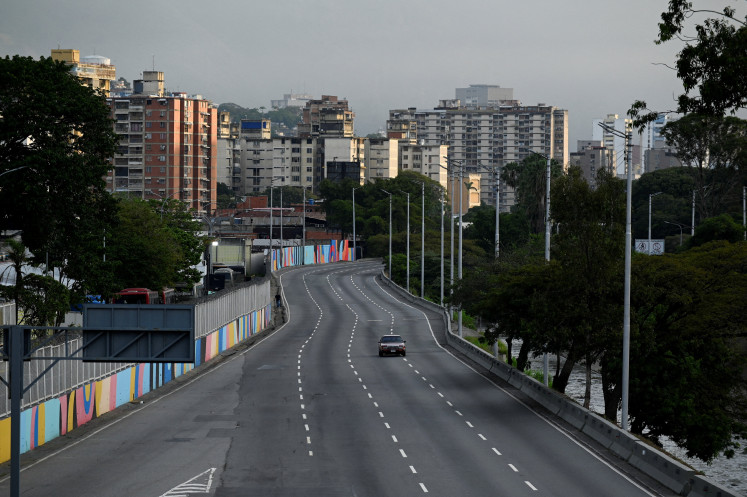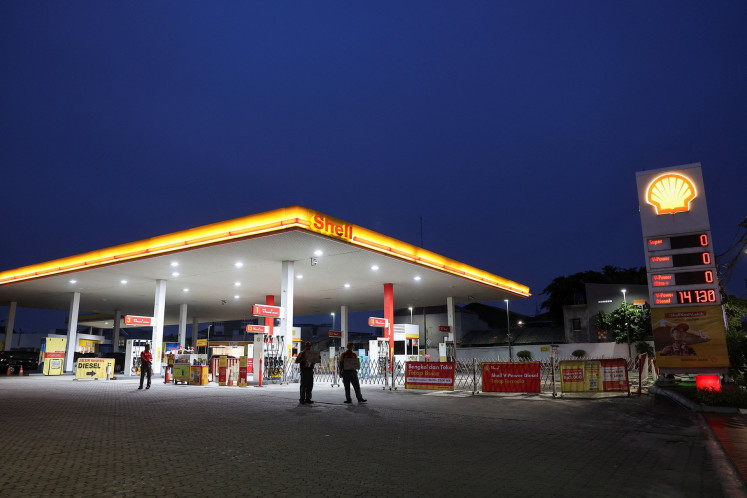Popular Reads
Top Results
Can't find what you're looking for?
View all search resultsPopular Reads
Top Results
Can't find what you're looking for?
View all search resultsCommentary: Tale of the fuel subsidy ' tax the poor, feed the rich
The nation appears to have settled down more than a month after the government raised the domestic prices of fuel
Change text size
Gift Premium Articles
to Anyone
T
he nation appears to have settled down more than a month after the government raised the domestic prices of fuel. Looking at the traffic congestion in Jakarta, which has gotten worse this past month, motorists seem to have absorbed the 44 percent higher prices. Fears of a popular revolt or social upheaval, the reason why it took the government over a year to raise the prices in late June, were grossly exaggerated.
Controversies about the direct cash subsidy for the poor to cushion them from the inflationary impact have been resolved. There is still the question of inflation, which jumped in July because the fuel hike came just before Ramadhan when Muslims in Indonesia spend more on food to add to the inflationary pressures. Barring unforeseen economic circumstances, however, inflation should ease after three months.
We can rest assured that the price of fuel will no longer be a hot political issue the way it has been for much of the past year. Unless world oil prices jump significantly, the fuel-price issue should not even appear in the 2014 election campaigns.
The nation's wealthy and burgeoning middle class, whose votes matter the most in 2014, must be quite content with the status quo. The poorest of the poor, whose cause is always good to champion if you are running for office, are equally content with the direct cash subsidy, even if the program does expire at the end of the year.
But if anyone seriously looks at the budget figures, the same moral argument forwarded by the government for increasing the fuel prices in June remains: The amount of money the government spends on fuel subsidies remains significantly large, and the lion's share of the subsidy is still going to the undeserving wealthy and middle classes.
The government is still forking out as much as 40 US cents in subsidy for every liter of Pertamina Premium fuel sold. For 2013, the subsidy bill is still estimated to be $20.2 billion. This will likely prove to be conservative and before the year's end, the finance minister will have turned to the House of Representatives for more money, as has been the practice in recent years.
Through the government fuel-subsidy policy, we are still throwing good money after bad. A lot of that money comes from honest taxpayers. There are many more other programs worthy of such huge financing. The poor in Indonesia certainly deserve much more than the rich and middle classes. The cash subsidy, at less than $1 billion, is only a small fraction of what the government spends on the middle class in fuel subsidies.
We are taking money from the poor and giving it to the rich, ironically with the government's help. Robin Hood could not have done a better job. President Susilo Bambang Yudhoyono camouflages his economic policies as being 'pro-poor' when in reality he is doing completely the opposite.
Since this is Ramadhan, it is probably timely to remind ourselves of one of the basic principles of Islam that is commonly found in all other religions: 'You shall not steal' or 'You shall not take what rightfully belongs to others.'
The principle of zakat (obligatory alms) in Islam is that part of your assets belong to someone else. Muslims are obliged to give at least 2.5 percent of their wealth to the poor through zakat. This is an entirely different concept from state taxes, for which you expect something in return in terms of public services, including your security and safety, for your tax rupiah. With zakat, you ought not to expect anything in return because the money does not belong to you in the first place. And those who fail to pay their zakat are essentially depriving the poor of their entitlements.
The same argument could be made about buying subsidized fuel. Those who continue to buy it are taking money that rightfully belongs to others, particularly the poor. It doesn't matter if the government is incompetent or corrupt, or that it is incapable of properly managing fuel supply and distribution ' reasons often cited by people opposed to fuel price hikes. The act of buying subsidized fuel is stealing from the poor, pure and simple.
Sadly after pushing this very line about the need to better target the subsidy during the 12-month campaign to raise fuel prices, the government is now absolutely silent even when the problem of imbalance is still staring it in the face. It pushed the argument about better targeting the subsidy only so far as to ease pressures on the budget and inflation.
Clearly, it was never serious or sincere about correcting the subsidy situation. Understandably, moral persuasion is never going to be the strongest point of this government, not when it has been hit by so many corruption scandals.
Do not expect our religious leaders to speak out against the immorality of the fuel-subsidy policy since they are part of the growing middle class. Their silence throughout the debate makes them complicit in depriving the nation's poor of what is rightfully theirs.
When the country's main Islamic party, which is part of Yudhoyono's coalition, became the strongest
opponent of the fuel price hike, by making moral claims that it was fighting for the people, the public deception was complete.
The story of the fuel subsidy in Indonesia is a story of stealing, cheating and lying.
God must be angry.










